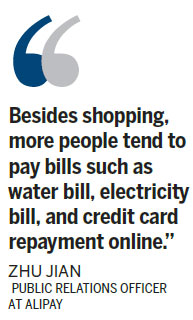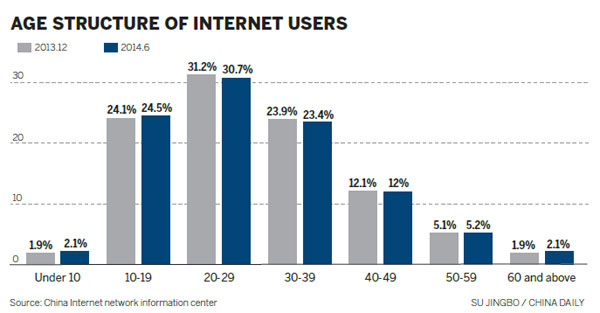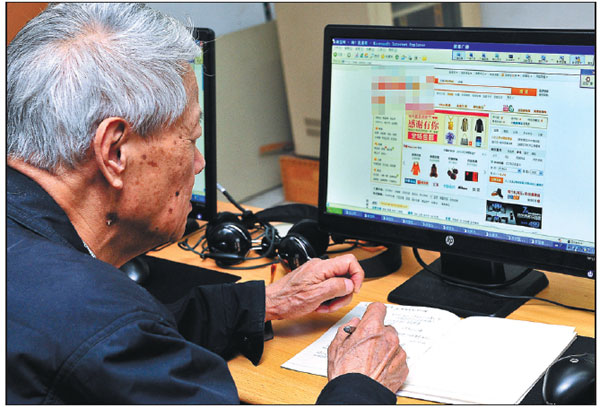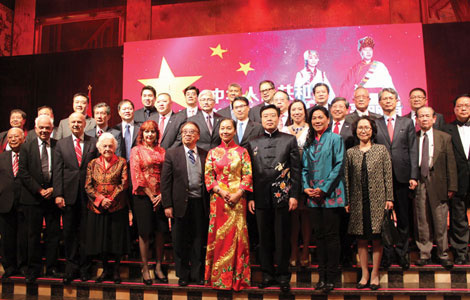Elderly sold on online shopping
Updated: 2015-01-02 09:23
By Du Xiaoying(China Daily)
|
||||||||
But Chinese e-commerce websites fail to pay more attention to older consumers, Du Xiaoying reports
They may be farmers, doctors, bankers, teachers, but once their hair has gone grey 20 years from now, their common denominator will be "consumer" in the world's largest and fastest growing consumption market.
In China, people's consumption habits are changing rapidly because of the Internet. There's been a perception that younger consumers have been the driving force of online buying. That may not be the case.
According to 2012's annual statement from Alipay, the payment arm of China's biggest e-commerce company Alibaba Group, the average expenditure of Alipay users born prior to the 1960s was 31,000 yuan ($4,988) in 2012, much higher than14,000yuan ($2,253) of those who were born after the 1980s.
The statement shows that online shopping has become a key part of people's daily consumption, for both young and old.
"Our users' online spending is growing every year," said Zhu Jian of the public relations department at Alipay. "We think that online consumption is becoming more and more important."

"Besides shopping, more people tend to pay bills such as water bill, electricity bill, and credit card repayment online," Zhu added," more than 10million Alipay users paid bills on our platform in 2012."
The middle-aged and senior consumers are not only witnesses of the consumption revolution, but also participants.
Liu Chen, 56, general manager of an IT company in Beijing, said that he always pays his telephone bill online, and his online expenditure in 2014 was over 50,000 yuan, about half of the total annual expenditure. Clothes, electrical appliances, kid's snacks are the main items he purchases online.
Liu's shopping strategy is to find something good online first, then go to shops to check it out, and finally buy it online because "the price is cheaper", Liu said.
As quality concerns him, Liu only buys items from the Internet that come with a warranty or that are of good quality, such as Samsung cameras, Apple Inc., products and brand retailers' clothes.
Another middle-aged interviewee follows a similar shopping pattern to Liu's.
HeYing, 58, are tired doctor living in Beijing, is also accustomed to paying telephone bills online because of convenience. Low prices draw her to shop online.
Like many Chinese middle-and-old aged, He was not familiar with the online shopping process and worried about the paying safety, so she asked her daughter for help.
After several online shopping experiences with assistance from her daughter, He is not worried about the safety of online shopping anymore. But quality is still a concern to her.
"It is too cheap to be good," he said. "Sometimes I was quite disappointed when I received the goods I bought online, as a lot of them were of bad quality. Many goods do not have the quality that their pictures show, some don't fit well, and some even don't have a label."
After a number of refund experiences, He decided to only buy from reliable brands and shops in the future, ones with good reputations.
Stories such as those from Liu and He are representative of millions of middle-aged and older Chinese, and which show the great potential of the aging in the Chinese consumption market. Yet, the market seems not to be valued, as it should be.
The Chinese marketing and consumption researchers have largely remained a vacuum for the market. It is hard to get professional and systematic reports on the elderly's consumption habits, consumer behavior and consumption trends. Information or reports that can be found either need updating or lack credibility.
Just like researchers, Chinese e-commerce websites have not paid much attention to older consumers. JD.com, dangdang.com and Amazon.cn don't have a specific category for goods for the elderly on their main pages. After keyword searching, there are only limited options available like clothes, food, healthcare appliances, etc.
Alibaba's platform Taobao.com does have a specific elderly goods category on the main page. But still, the goods in the category are not as abundant as other categories such as babycare.
Moreover, Taobao's category is not really designed for elders, but their children. The "Mum's clothes", "Dad's shoes" subdivision categories more or less show Taobao doesn't consider the middle-to older ages as their target customers.
Despite the seeming lack of commitment to middle-and senior age consumers, the Chinese market for the elderly is clearly huge and growing. The question China faces is how to improve it. Maybe its neighbor Japan, more advanced with its aging society, can be a model.
Japan has been an aging society for years. In 2013, more than a quarter of its population (31.9 million) was above 65.The specialized market is mature, with plenty of products for aging people available there.
Pan Xiaojing, a 60-year-old former Chinese diplomat who lives in Japan 15 years, thinks the Japanese society is more "elderly friendly" in many aspects. Most of products there have special mode for elderly, for instance.
Survey of internet growth in China
By the end of June 2014, the number of Internet users in China is 632 million, and mobile Internet users is 527 million.
By the end of June 2014, the proportion of mobile phones (83.4percent) as access to the Internet overtaking the traditional PC (80.9percent) for the first time, and the mobile Internet has driven the overall development of the Internet.
Meanwhile, the mobile phone's utilization ratio in mobile e-business, entertainment, information acquisition and communication applications grows rapidly, the mobile Internet has driven the development of various Internet applications.
In the first half of 2014, payment applications grew the fastest in both the entire market and the market of mobile terminal.
By the end of June 2014, the Internet users aged above 50 had accounted for 7.3 percent. The proportion rose by 0.3 percent compared with that at the end of 2013. The Internet is continuing to penetrate into the elderly population.
Contact the writer at duxiaoying1@chinadaily.com.cn

|
Online shopping has changed Chinese people's shopping habits, including those middle-aged and senior consumers. Zhang Chaoqun / Xinhua |
(China Daily 01/02/2015 page7)
- 1st body identified from AirAsia crash handed to family
- Year-end review 2014: Women's issues
- Ex-Korean Air 'nut rage' exec arrested
- Top DPRK leader says no reason not to hold high-level north-south talks
- New Year's Eve celebration in Times Square
- Death toll from tropical storm rises to 35 in Philippines
Most Viewed
Editor's Picks

|

|

|

|

|

|
Today's Top News
U of M responds to rise in Chinese undergraduate enrollment
Adopted girl comforts kids in emergencies
Tmall Global's sales rose tenfold in 2014
Yunnan helps rock Times Square celebration
36 killed, 47 injured in Shanghai stampede
US sorghum exports to China hit 19-year high
China's Fosun buys US insurance market
Brazil's Rousseff vows fiscal austerity in second term
US Weekly

|

|















